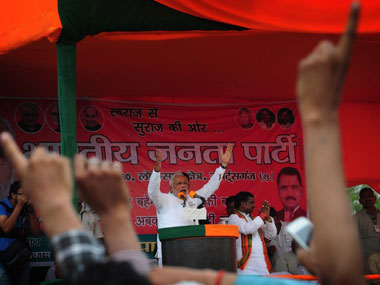Varanasi: In the world’s largest democratic exercise, the ongoing general elections involving 814 million voters, how much power does an individual voter actually wield? I tried to find an answer to this question during the last two days of campaigning – May 9th and 10th – when the political frenzy was at its height in Varanasi.
There was hardly a street in Varanasi that was left out of the political festivities – crisscrossing rallies with thousands of people; flags of BJP, AAP and Samajwadi Party painted the sky saffron, white and red. Every small tea shop in the city was bustling with talk of the upcoming elections. Almost everyone in the city, voter or not, shook a leg in the dance of democracy.
“If we could just bring about change by voting intelligently, at least something would have happened in the past 67 years of independent India. Nothing has changed, at least for us” said Bansi Lal, a tea seller in the Shivaji Nagar area. “The fact is that the politicians only claim to be public servants, they actually are still our mai baap (emperors),” he added.
Mr Lal’s contention was shared by several who attended the Narendra Modi and Rahul Gandhi rallies.
Before the exhausting heat could take over, early in the morning, Ahmed Amin and his friends started cleaning up the roads in front of their Madrasa at the Gol Gadda Chauraha in Varanasi, where Rahul Gandhi would begin his last road show before the elections.
Mr Amin and his friends waited for more than an hour and a half in the heat before Gandhi’s open air truck showed up at the crossing. The delighted crowd roared in happiness when Rahul Gandhi, with folded hands, smiled warmly at them. Nudging his way through the crowds, Mr Amin progressed towards the truck which had Rahul Gandhi, but before he could reach it and catch a glimpse of his deified politician, the truck had moved on.
Things were no different at the Narendra Modi rally in Ghazipur, 72 kilometers east of Varanasi. About 50,000 people waited for 45 minutes in the scorching afternoon sun, waiting to see Narendra Modi, when the local politician’s speech was interrupted by thunderous noises from the sky. Like the gods metaphorically descend from the heavens, Modi’s helicopter descended on a make-shift helipad amidst the crowd. For a few seconds, the crowds were blinded by the dust that the fans of the chopper had kicked up, but the cheering didnt abate. “Har Har Modi” they chanted. The chant is a play on “Har Har Mahadev” which is an age-old praise for Lord Shiva.
“Kaisi sarkaar chahiye aapko?” he asked the crowds. What kind of a government do you want?
“Modi sarkaar!” came the vociferous reply. (One that is Modi’s.)
“Does it not seem like Modi ji is the answer to all our questions?” asked Kisan Tiwari, 34. “I think Modi ji is our God. We were tried enough, we needed someone to come and rescue us,” he added.
The moot issue is not about personalities contesting. The issue here is about people believing in their politicians to be the cure for all ills. So much so, that many voters have little idea about what their politicians’ manifestos have.
Varanasi, for instance, has a multitude of problems – poor infrastructure, filthy pavements, acute unemployment and a polluted Ganges. While some political speeches do include references to these, voters seem to enjoy snidy jibes and witty remarks on competitors more. Politics has become more of an entertainment and a break from the mundane.
“We are excited,” said Gangu Halwai, 44. “Dont know when our city would be so charged up next!”
Published in: FirstPost
Published on: May 14, 2014
Link: http://www.firstpost.com/politics/for-the-aam-aadmi-voter-rahul-modi-are-still-mai-baap-1523783.html


